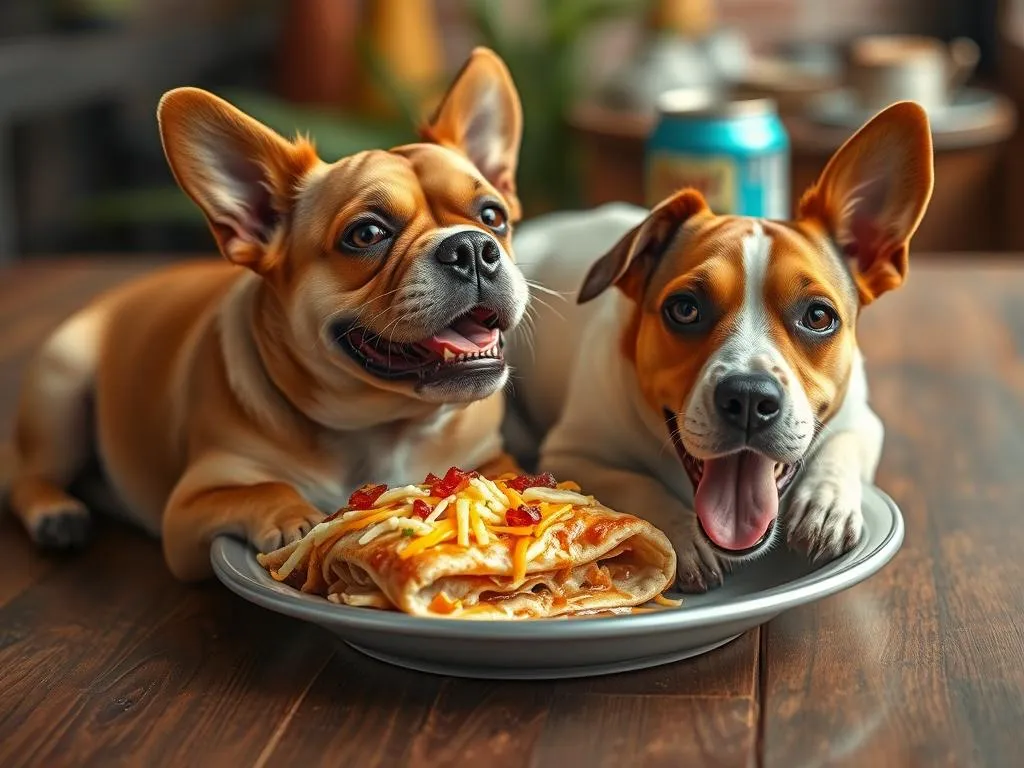
Dog nutrition is a critical aspect of pet ownership that often gets overlooked. With the increasing popularity of sharing meals with our furry friends, many pet owners wonder about the safety of various human foods. One such popular dish that sparks curiosity is enchiladas. So, can dogs eat enchiladas? Let’s dive into the details of dog nutrition, the ingredients typically found in enchiladas, and whether or not these tasty treats are safe for our canine companions.
Understanding Dog Nutrition
Basic Nutritional Needs
To understand whether dogs can eat enchiladas, it’s essential to first grasp the basics of dog nutrition. Dogs, like humans, require a balanced diet composed of several key nutrients, including:
- Proteins: Vital for growth, repair, and overall health.
- Fats: Provide energy and help in the absorption of certain vitamins.
- Carbohydrates: Serve as a source of energy and aid in digestive health.
- Vitamins and Minerals: Support various bodily functions, including immune health and bone strength.
A balanced diet ensures that dogs receive all necessary nutrients to thrive. Commercial dog foods are formulated to meet these needs, but it’s crucial for pet owners to understand what goes into their dog’s diet.
Common Ingredients in Dog Food
Dog food typically contains a mix of meat, grains, vegetables, and added vitamins and minerals. Common ingredients include:
- Chicken or beef as protein sources
- Brown rice or oatmeal for carbohydrates
- Sweet potatoes and peas for fiber
- Added vitamins, such as A, D, and E, along with minerals like calcium and phosphorus
When purchasing dog food, reading the labels is vital. Look for high-quality ingredients and avoid foods with excessive fillers or artificial additives.
Foods to Avoid
While many human foods are safe for dogs, some can be hazardous or even toxic. Here are a few common foods to avoid:
- Chocolate: Contains theobromine, which is toxic to dogs.
- Grapes and raisins: Can lead to kidney failure.
- Onions and garlic: May damage red blood cells and cause anemia.
- Avocado: Contains persin, which can be harmful to dogs.
Understanding which foods are harmful is crucial for any dog owner, especially when considering sharing human food like enchiladas.
What Are Enchiladas?
Ingredients Typically Found in Enchiladas
Enchiladas are a beloved Mexican dish, often made with a variety of ingredients that can pose challenges for dog owners. Common components include:
- Tortillas: Usually made from corn or wheat.
- Meats: Commonly chicken, beef, or cheese.
- Cheeses: Varieties like cheddar or queso blanco.
- Sauces: Enchilada sauce, which can include tomatoes, chili peppers, and spices.
- Toppings: Such as sour cream, guacamole, or olives.
Each ingredient brings its own set of nutritional values and potential risks, especially considering allergies and sensitivities in dogs.
Nutritional Breakdown
A typical enchilada dish is rich in calories, fats, and carbohydrates, but may lack essential nutrients required for dog health. The nutritional profile can vary significantly depending on the preparation and ingredients used. For example:
- Protein: The meat provides protein, which is beneficial, but the type of meat matters.
- Fats: Cheese and sauces can add significant fat content, which may lead to obesity or pancreatitis in dogs if consumed in excess.
- Carbohydrates: Tortillas add carbohydrates, but these may not be suitable for all dogs, especially those with grain sensitivities.
Understanding the nutritional breakdown helps in assessing whether dogs can eat enchiladas safely.
Can Dogs Eat Enchiladas?
Assessing the Ingredients
Let’s analyze the primary ingredients found in enchiladas and their effects on dogs:
-
Tortillas: Generally made from corn or wheat, tortillas can be safe for dogs in small amounts. However, some dogs may have allergies or sensitivities to gluten.
-
Meat: Cooked chicken or beef is safe for dogs, provided it’s plain and free of seasoning. However, processed meats or those with additives can be harmful.
-
Cheese: While cheese can be a tasty treat for some dogs, many are lactose intolerant. Giving cheese in moderation is key, and it’s best to opt for low-fat varieties.
-
Sauces and Spices: Many enchilada sauces contain onions, garlic, or spices that are toxic to dogs. Even small amounts can lead to gastrointestinal upset or worse.
Digestive Considerations
Dogs have a different digestive system than humans. Their stomachs are designed to process raw meat and have a shorter digestive tract, meaning human food can lead to gastrointestinal issues. Feeding dogs human food, especially rich or spicy foods like enchiladas, can cause:
- Vomiting
- Diarrhea
- Bloating
- Pancreatitis
Therefore, it’s crucial to consider how dogs might react to consuming enchiladas, even in small amounts.
Risks and Considerations
Feeding dogs enchiladas poses various risks, primarily due to the potential toxicity of certain ingredients. If a dog accidentally consumes an enchilada, here are some considerations:
-
Portion Control: If the enchiladas were small and made with safe ingredients, occasional consumption may not lead to severe issues. However, moderation is essential.
-
Monitoring: Watch for signs of distress, such as vomiting, diarrhea, or lethargy. If any of these symptoms occur, contact your veterinarian.
-
Consulting a Veterinarian: For personalized dietary advice, it’s always best to consult with a veterinarian, especially if your dog has health concerns or dietary restrictions.
Alternatives to Enchiladas
Dog-Friendly Recipes
If you’re looking for alternatives to enchiladas that your dog can safely enjoy, consider these homemade recipes:
-
Chicken and Sweet Potato Enchiladas: Use whole wheat tortillas, shredded chicken, and mashed sweet potatoes, topped with low-fat cheese. Bake until heated through.
-
Vegetarian Enchiladas: Fill corn tortillas with cooked zucchini, carrots, and a small amount of cottage cheese, topped with a simple tomato sauce.
Store-Bought Options
For those who prefer convenience, there are commercially available dog foods and treats that mimic enchilada flavors without harmful ingredients. Look for options labeled as “grain-free” or “low-fat” that contain safe ingredients for dogs.
Conclusion
In summary, while the question of can dogs eat enchiladas may seem straightforward, the reality is more nuanced. The various ingredients that comprise enchiladas can pose risks to dogs, particularly due to toxic components like onions and spices. It’s essential to prioritize a balanced diet tailored to your dog’s specific needs and to be cautious when considering sharing human food.
For any dietary changes or concerns, consulting with a veterinarian is always the best course of action, ensuring your furry friend remains healthy and happy.
Frequently Asked Questions (FAQs)
Can dogs eat tortillas?
Yes, dogs can eat tortillas in moderation, but watch for gluten sensitivities.
What should I do if my dog eats enchiladas?
Monitor for symptoms like vomiting or diarrhea, and consult your vet if concerned.
Are there any benefits of feeding dogs human food?
Occasionally, safe human food can provide variety and enrichment, but it should not replace a balanced diet.
How can I transition my dog to a better diet?
Introduce new foods gradually, mixing them with their current diet, and consult your vet for specific guidance.
By understanding dog nutrition and the implications of feeding dogs human food, pet owners can make informed decisions. Always prioritize your pet’s health and well-being, keeping them safe and nourished with appropriate diets.









